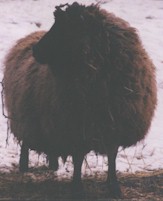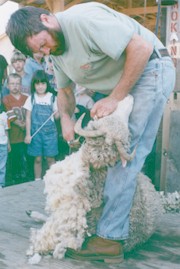Picture: Ewe near full fleece at end of winter. The sheep is a Shetland/Finn cross.

| (7) Shearing. You can do it yourself or
hire a shearer. The point is to make sure it is done at least annually (with
some breeds you may want to do it more often). Shearing isn't just done
if you want the wool, or for aesthetics. Most breeds have had the ability to shed
bred out of them by people, and need to be shorn for their health. If you
don't want to take this on, consider goats or a sheep breed such as Katahdin.
See list of shearers (mostly in Central
Maine). Picture: Ewe near full fleece at end of winter. The sheep is a Shetland/Finn cross. |
 |
 Picture: Shearing demonstration by Lee Straw at Common Ground Fair (1999). The sheep is a Horned Dorset. |
(8) Hoof trimming. You can easily do the trimming
yourself. Ask someone to show you how. The usual way to hold the
sheep is to flip the sheep gently onto his or her backside (same as when begin
shearing). However, if you're small and have a big sheep, there is another
way. You can put a halter and lead rope on a sheep, tie the sheep to a wall,
and do the hooves with the sheep standing up (like a horse). Don't start
trimming until you get the sheep to calm down while you are holding his or her hoof (watch
a good farrier trimming a nervous horse, and you'll get the idea). Talk quietly to
the sheep. You'd never want to do this with a lot of sheep (it takes time)
but...if it works. Another note on trimming--the flipping thing doesn't work well with lambs (they wiggle away). It is easier to sit on a low stool, put the lamb on its backside, and hold it between your knees (lamb on backside, but supported by your knees). |
You'll still want to learn how to gently flip a sheep onto his or her backside. There are times when only that will do.
(9) Vaccinations. You can give most vaccinations yourself (get someone to show you how). In Maine, a rabies vaccination must be given by a vet.